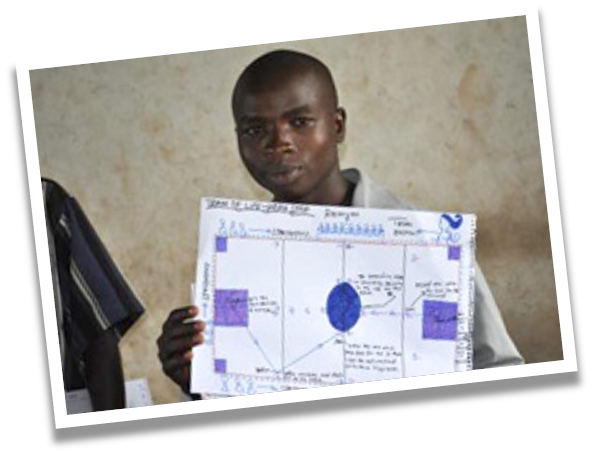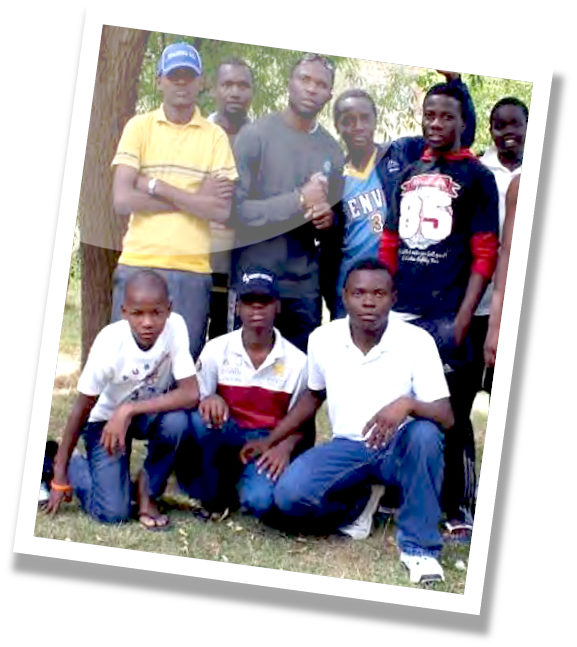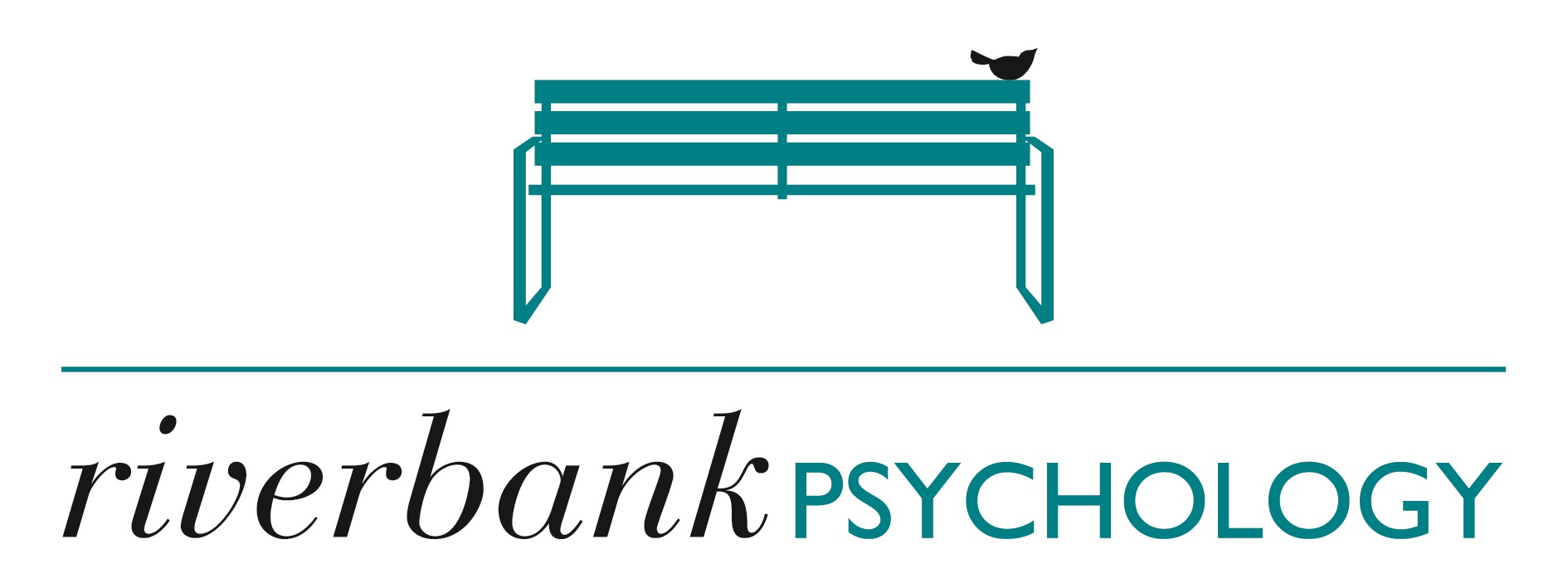
Based upon Collective Narrative Practice, which are methodologies for community work, Team of Life develops “social resilience” by helping people to recognise and build their support networks and become more aware of their strengths and achievements.
A strength-based approach Underpinned by Narrative Therapy

Team of Life uses the universal language of sport to help people identify key “team-mates” in their lives and create strength-based stories through sporting metaphor. This develops resilience by building a sense of social support and connected identity, whilst celebrating the collective contributions of teams in playful and creative ways.
The Team of Life methodology can be used with individuals or groups in schools or other settings working with children and young people. It was originally developed with former child soldiers in Uganda and has frequently been used with refugee groups. See the Dulwich Centre for more information.
We train practitioners in this innovative approach, visit our Training Site to find out about our Team of Life Facilitator Training. 
What is unique about Team of Life?
While social factors are widely viewed as responsible for increases in children’s mental health problems, most interventions focus on individual challenges. Instead, Team of Life builds “social resilience” by helping children and young people to recognise and build their support networks and become more aware of their strengths and achievements.
Research on resilience has shown that having multiple sources of support is a significant protective factor for children and young people. We know from our own research that Team of Life can help children to be more aware of the support available to them and feel more able to ask for help when needed.
“It helped me realise I am not alone and it’s okay to ask for help” – Team of Life Participant
Outcomes and beneficiaries of the Team of Life programme . . .
- What are the outcomes?
Team of Life helps children to feel less isolated, be less socially withdrawn and show more pro-social behaviour such as kindness and friendliness. - Who are the beneficiaries?
The programme is aimed at children and young people aged 7-13, although Team of Life benefits everyone by encouraging reflection on the important people in our lives. - Who does it particularly help?
The approach is especially helpful for children and young people who have experienced losses, trauma or hardship, low-level mental health problems, concerns about transitioning to secondary school, difficulties with friendships and self-esteem issues.

Building Resilience Systemically
Utilising a Narrative Therapy approach, the Team of Life programme offers a systemic way of working that doesn’t just support resilience at the individual level of the child or young person. It also acknowledges the social and political determinants of health and the importance of the environment and community around children. From a socio-ecological perspective (Bronfenbrenner, 1979) Team of Life, with its underpinnings in narrative therapy, helps us to work at the level of the relationships between individual and environmental factors.

We train practitioners in this innovative approach, visit our Training Site to find out about our Team of Life Facilitator Training.
Team of Life Heritage

Our aim is for as many children and young people as possible to have the opportunity to take part in Team of Life; ensuring they have a sense of connected identity and know they are not alone but have a team around them to help them face hardships and challenges in life.
While working towards our mission at home we are also keen to acknowledge the heritage of Team of Life and those who have paved the way for our Team of Life work here in the UK. The Team of Life began in Southern Africa in work that the Dulwich Centre Foundation was doing with former child soldiers. A percentage of proceeds therefore go to support ongoing work by the Dulwich Centre with communities in Africa.

What children say . . .
Qualitative research with children who participated in Team of Life highlighted benefits in a number of domains:
- Appreciating Others
“It reminds you of who’s there for you, and like who can look after you when you’re down” - Getting Support
“If I wanna do something I try and ask my parents if they wanna help me” - Improved Interactions
“It helps you realise that sometimes when you be mean to somebody you don’t have to be mean to them over a tiny thing” - Teamwork
“Yeah, I used to just kind of work on my own but now I like working in a team” - Helping Others
“I think just like being kinder to people and like if someone’s sitting there upset I’ll go over and talk to them” - Achieving Goals
“Team of Life helped me achieve it and it’ll help me because now I know I can achieve my goals I think I might set a few more” - Increased Confidence
“I’m a lot more confident speaking out in class”
What practitioners say . . .
Testimonials about Team of Life
“I am now looking forwards to promoting Team of Life to all 9 high schools in St Helens. I will be using the course across schools for those who are at risk of being permanently excluded. I work closely with referred families and i genuinely believe that narrative therapy may build bonds between school, students and parents.”
Andrew Hastings – Secondary Behaviour Improvement Teacher, TESSA, St Helens Borough Council
“I have delivered the Team of Life programme as an EMHP to primary school and secondary school pupils. The engagement, progress and positive impact was quick and very much noticeable after the first few sessions. I had great pleasure in delivering Team of Life and loved seeing the fruitful impact it had on children and young people who were in need of the support. The impacts of Team of Life are lasting and truly changing lives. Most of all, the CYPs absolutely loved it and took away valuable, everyday life skills.”
Sabahat Malik – Senior Practitioner, Hertfordshire Partnership NHS Foundation Trust
“I have delivered Team of Life to 4 groups of young people ranging from year 3 to year 6. I find it is a lovely piece of work. I have seen how some young people have flourished and gained confidence to join clubs in and out of school, plus take part in assemblies and school performances. SENCO’s have commented that they can see a difference in the young people who have taken part in Team of Life.”
Jayne Hart, Educational Mental Health Practitioner, Wirral Mental Health Support Team
“It complemented the atmosphere of reflection and celebration that we try to foster throughout Year 6 and especially during the second half of the summer term. We have been very fortunate to have been involved in the programme and are looking forward to having our own in-house practitioner so that we can experience its impact in other aspects of our work.”
David Hird, Deputy Headteacher, Netherton Moss Primary School, Sefton.
“One child said ‘ I feel so much happier than I was’’. A child tackled a problem of bullying – loved his advice, ‘’When you are bullied, it is good to tell an adult because holding on is not good’’. From delivering Team of Life I feel it not only empowers the young people but it lets those working with the young person’s to know more about the great support there is surrounding the children! I am amazed that through the Team of Life you uncover so much about the child’s voice, and that promotes empathy and understanding and builds relationships!”
Laura North, Family Worker Buckinghamshire Mental Health Support Team
“The Team of Life training provided by Riverbank Psychology was incredibly helpful to our team. The experiential learning enabled the team to fully embrace the Team of Life approach and we all hugely enjoyed the training whilst learning a great deal. The training provided the opportunity for the team to learn about each other, consider who is in our own ‘team of life’ and reflect on our values. I would highly recommend this training to anyone who is looking to run Team of Life.”
Dr Laura Tozer, Clinical Psychologist, Buckinghamshire Mental Health Support Team
“The Team of Life provides a common language that most students understand… I consistently witness students experiencing an appreciation and understanding of the value of support networks and how this has a positive impact on their lives. I have been particularly struck by the importance of stories, which comes from a narrative approach and how this can be used for children to tell their story, with a deeper understanding of how their experiences shape their attitude towards the future, finding key positive learning experiences from difficult circumstances.”
Claire Owens, Director, Next Chapter CIC
Training for the children’s workforce
Teaching you to deliver our unique resilience programme

As part of our work with schools and NHS, we have developed a 6 hour programme for children aged 7 and upwards.
Our programme builds resilience and capacity by activating children and young people’s support systems.
Single Practitioners
Facilitator training package
Help children and young people build support networks and recognise their strengths. Training includes on-demand online video lessons and activities. Study at your own pace: 7 hours of training available 24/7 for 90 days. The package also includes an annual subscription to our platform for support, which gives you access to downloadable resources and online video delivery support.

Organisations
Bespoke training packages for your team or organisation
Develop your team’s skills in our systemic, strengths-based programme for children and young people. Training is available on-demand online or as a 1-day live session (online or face to face). Packages include an annual subscription for support and downloadable resources. Contact us to discuss your requirements.

Schools
Whole school package
Includes training in our programme for the whole school community enabling you to build social resilience and create a culture of belonging and wellbeing. Training is available face to face or online. Packages include an annual subscription for support and resources.


Visit our Training Site to find out about our Team of Life Facilitator Training.

Example activity – Goal Maps
An example of one of the narrative activities in the programme are Goal Maps. Goal Maps are a really important part of the programme as they help children and young people to share the story of how they worked together with their team to ‘score’ an important goal in their life.
“The goal maps, it kinda gave me an idea of other ways to reach my goals and people I could use ‘cause I have many goals but normally I don’t ask people to help me out, I try and do it solo, but it doesn’t always work out, so it really made me think about other people I could ask for help if I need to achieve a goal.”
Charlie’s Goal Map illustrates goal maps for children and young people
FAQ’s
- Are there any specific qualifications required to become a licensed facilitator?
No specific qualifications are required to attend the training and become a facilitator. We aim to involve service users and experts by experience in the delivery of Team of Life as well as professionals. - Are there any ongoing costs to becoming certified?
Access to the online course is for 3 months from the date of purchase and access to the delivery support is available for one year. Following this a small additional administration fee (currently £40 per person) is charged in order to have continued access to the delivery support including resources that are regularly being updated. The downloadable resources can be printed for use with young people. There is no additional charge for this. - How is training delivered?
The online course is on demand training with video lessons. Live in person training (face to face or online) is also available for organisations. Contact us to discuss your requirements. - Can I copy or share the Team of Life resources with colleagues?
No, this would be a copyright infringement. The resources are for individual use by the person who has undertaken training. This is important to ensure that people delivering Team of Life have the necessary understanding of the approach. If you would like to purchase training as an organisation please contact us to discuss your requirements. - Can I attend training as a team?
Yes! We highly recommend attending training as a team as you get added team building benefits due to the experiential nature of the training. Why not take time as a team to think about your shared values, support networks and goals? Contact us for more information. - What age is the Team of Life for?
Our Team of Life Resilience programme has been developed with children aged 7-13 years in mind. However, the Team of Life approach is suitable for everyone. - Is Team of Life just for children?
No, Team of Life is for everyone. You can use the approach with families, individuals, adults and staff groups to help build resilience and teams. - Do you have to like sport to take part?
No, our research has found that children enjoy and benefit from taking part in Team of Life whether or not they like sport. Team of Life doesn’t involve any sporting ability. It uses sporting metaphors which provide an easy to grasp universal language that is familiar to people of all ages. Space is provided to share knowledge and experience of sport good and bad. - Is Team of Life aimed at boys?
No, our research has shown that girls enjoy and benefit from Team of Life just as much.
